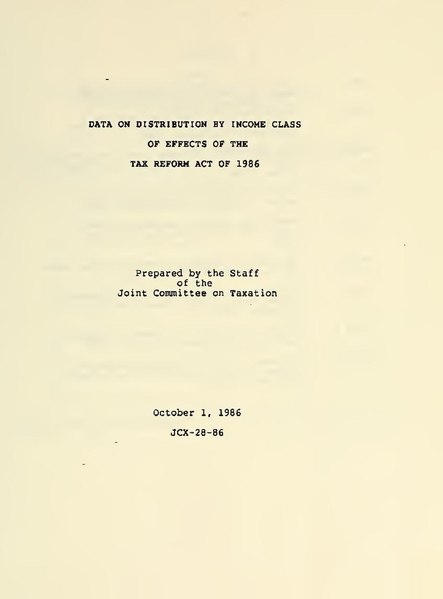Originally published on Forbes.com May 27th, 2013
I smell comprehensive tax reform in the wind. The last time, it started with a report to President Reagan from the Treasury Department. What they were aiming for was a system that raised revenue with minimal distortion of the economy. They were encouraging the President and the Congress to stop using the Tax Code like it was the Ring of Power. We know what happened
The Tax Reform Act of 1986 commenced the Third Age of Tax Reform (1939 and 1954 came before). I had a great time with it. I had taken the rumors of imminent tax simplification seriously. Rather than get a masters in taxation, I got a masters in applied mathematics, since by 1990, the need for tax professionals would be so diminished. The 1984 report to the President had indicated that the IRS was gearing to prepare people’s returns for them on an optional basis.
Then the Act came out and for a brief moment somebody who liked to spend his time reading arcane matter rather than “networking” could shine. Basically the acquired tax wisdom of an almost seventy year old firm, that had been passed down more by oral tradition than direct reference to original source material, was mostly wrong.
What Congress failed to do in 1986 was Ilsidur’s failure. It could not renounce forever the use of the Ring of Power. After 1986, changes in the Tax Code should have been tweaks to further refine simplicity and economic neutrality. Instead, having done a massive simplification, they started gradually adding complications.
The big problem is that using the Tax Code to encourage desired behavior and discourage undesired behavior seems like an irresistible free lunch. The beneficiaries of each special rule will have a fierce devotion to it. They might agree with the concept of simplification in general, but the importance of the Low Income Tax Credit to affordable housing, for example, greatly outweighs the small amount of simplification that eliminating that one credit would achieve. To see the phenomenon on display, one only has to look at the comments that have been submitted to the House Ways and Means Committee Tax Reform Working Groups.
I would say the comments go from A-Z, but they actually start before A, with a submission from 1031 Asset Exchange, which tells the Real Estate Tax Reform Working Group that:
IRC §1031 is neither a loophole, nor a tax savings vehicle, but rather a powerful economic engine based on sound tax policy
A group called ACTION (A Call To Invest In Our Neighborhoods) discusses how crucial Section 42, the Low Income Housing Credit, is to affordable housing.
From the Advisory Council on Historic Preservation the Real Estate Working Group heard:
As the country continues its economic recovery, the historic tax credit has a critically important role to play in restoring buildings and bringing renewed vitality to America’s city centers and Main Street corridors. We respectfully request that you carefully consider the effectiveness, value, and reach of the historic tax credit, and its impact on American communities as you proceed with your assessment of tax code reform priorities.
The Treasurer of California wanted several of the working groups to know that the municipal bond exemption was very important:
Eliminating or reducing the tax exemption will greatly limit our ability to address our infrastructure needs, resulting in fewer projects, fewer jobs and deteriorating infrastructure.
The Knights of Columbus wanted the working group to know how important 501(c)(8) is. In case you, like I, had forgotten what 501(c)(8) was, here is a pretty good explanation. I haven’t heard anybody was gunning for 501(c)(8), but the Knights are not taking any chances.
Halliburton came out swinging to protect expensing of intangible drilling costs.
I did finally find a group that wants to prune the Code, at least a little, Secular Coalition for America wants to eliminate the exemption that churches have from rules covering other exempt organizations. Of course, in principle, that might make more work for the IRS.
The above are a very small sample of the comments. The primary theme is “Hooray for tax simplification, but not in my back yard”. There was one exception that I noted, 3M Company would throw the R&D credit and accelerated depreciation under the bus in exchange for lower rates. Of course, after we get the Internal Revenue Code of 2014 enacted, they might be back in 2016 explaining how much better things were when we had an R&D credit.
I’m afraid that a messy, complicated Tax Code is one of the prices we have to pay for living in a free country. I doubt that the current simplification push will do as well as 1986. That started out with something that was designed by tax geeks and economists who were locked in a back room for a couple of months. Those guys wanted to get rid of the main justification for favorable capital gains rates by indexing the basis of assets for inflation.
I think Congress rightly concluded that basis indexing would confuse the hell out of everybody so they didn’t include it. They eliminated the special rate for capital gains, but it was not long before it came back. Also, they were starting from much higher marginal rates, so the dramatic rate reductions made the costly simplifications much more palatable.
This time there does not appear to be anybody putting together a comprehensive plan that Congress will then tweak. Rather it seems to be more of a free for all. You can also count on much of what is done being undone in fairly short order
You can follow me on twitter @peterreillycpa.































































































